SRM-AP All News
ALL News
- Dr Sarita Vig on “Wonders of Cosmos” July 16, 2021
 Electronics and Communication Engineering (ECE) department of SRM University-AP in association with The Institute of Engineers (India), AP State Chapter and the Institution of Electronics and Telecommunication Engineers (IETE) Vijayawada Chapter has conducted a webinar titled “Wonders of Cosmos” on Saturday, April 17, 2021, at 3.00 pm through Zoom. The guest speaker Dr Sarita Vig from the Department of Earth & Space Sciences at IIST, Thiruvananthapuram, Kerala highlighted the basics of astronomy enlightening on the fundamentals and overview of the high-end telescopes found globally.
Electronics and Communication Engineering (ECE) department of SRM University-AP in association with The Institute of Engineers (India), AP State Chapter and the Institution of Electronics and Telecommunication Engineers (IETE) Vijayawada Chapter has conducted a webinar titled “Wonders of Cosmos” on Saturday, April 17, 2021, at 3.00 pm through Zoom. The guest speaker Dr Sarita Vig from the Department of Earth & Space Sciences at IIST, Thiruvananthapuram, Kerala highlighted the basics of astronomy enlightening on the fundamentals and overview of the high-end telescopes found globally.Addressing the session, Dr CV Sriram, Hon. Secretary of IEI APSC opened the virtual podium to other dignitaries. Dr Geetha Devi from IETE introduced Dr Sarita Vig; Er. Kalee Prasad, Honourable Secretary; and Dr Ramanjaneyulu Fiete, Chairman of IETE. Dr Sujith Kalluri from the ECE department at SRM University-AP was the coordinator and organiser of the event.
Dr Sarita in her presentation elaborated on the different types of telescopes and observatories such as the CGRO, HST, SIRTF, CHANDRA. She discussed the elements responsible for the inception of the universe and the astrophysical processes behind it. Further, she talked about other planets which can be considered as a potential place for habitat like our earth. She also mentioned the supernova remnant crab nebula which was exploded billions of years ago and was even witnessed in the daylight, as per Chinese and Mexican researchers.
Towards the end of the session, Dr Sarita presented the facts about the black hole in the centre of the massive galaxy M87. “In 2019, Event Horizon Telescope helped to get the image of the black hole in radio wavelength. The universe is expanding and it is not in a static form,” she said. The webinar came to an end with an interactive Q&A session between the panellists and participants.
Continue reading → - Dr Nimai Mishra’s research group develops a new synthetic strategy to make ultra-stable CsPbBr3 perovskite nanocrystals for light-emitting application July 14, 2021
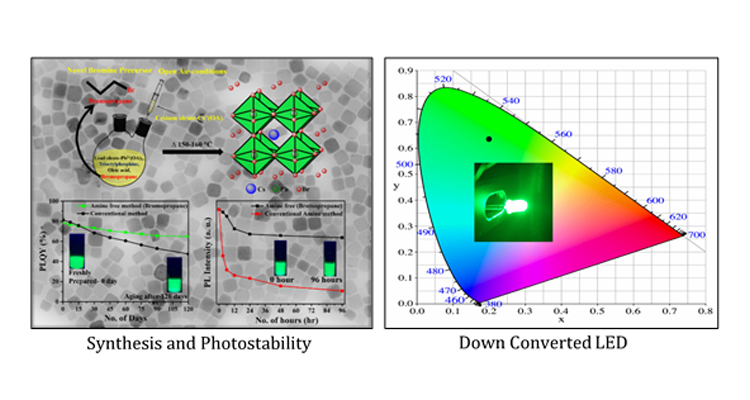 Dr Nimai Mishra, Assistant Professor in the Department of Chemistry, SRM University-AP, Andhra Pradesh, along with his research group comprising of students pursuing PhD under his supervision, Mr Syed Akhil and Ms V.G.Vasavi Dutt have published a research article titled “Bromopropane as a Novel Bromine Precursor for the Completely Amine Free Colloidal Synthesis of Ultra-Stable and Highly Luminescent Green-Emitting Cesium Lead Bromide (CsPbBr3) Perovskite Nanocrystals” in the Journal “Nanoscale” (The Royal Society of Chemistry, Impact Factor-7.8).
Dr Nimai Mishra, Assistant Professor in the Department of Chemistry, SRM University-AP, Andhra Pradesh, along with his research group comprising of students pursuing PhD under his supervision, Mr Syed Akhil and Ms V.G.Vasavi Dutt have published a research article titled “Bromopropane as a Novel Bromine Precursor for the Completely Amine Free Colloidal Synthesis of Ultra-Stable and Highly Luminescent Green-Emitting Cesium Lead Bromide (CsPbBr3) Perovskite Nanocrystals” in the Journal “Nanoscale” (The Royal Society of Chemistry, Impact Factor-7.8).Recently, lead halide perovskite nanocrystals (PNCs) have attracted intense interest as promising active materials for optoelectronic devices. However, their extensive applications are still hampered by poor stability in ambient conditions. In this work, Dr Mishra’s research group report an open-atmospheric, facile, efficient, completely amine-free synthesis of caesium lead bromide perovskite nanocrystals using a novel bromine precursor, bromopropane, which is inexpensive, and available at hand. Their finding concludes that the PLQY can maintain 83% of their initial one even after 120 days. Furthermore, after 96 h of continuous irradiation by UV light with 365 nm (8 W/cm2) in the open ambient condition the photoluminescence (PL) intensity showed retention of 68% of its original value with no significant change in full width at half-maximum, whereas amine-based sample retains only 5% of its original PL intensity. Furthermore, Dr Mishra’s group has fabricated stable down-converted LED devices with these perovskite nanocrystals.
“More importantly, the present work demonstrates the synthesis of ultra-stable CsPbBr3 NCs which can be an ideal candidate for display applications”, says Dr Nimai Mishra.
Read the full paper: https://pubs.rsc.org/en/Content/ArticleLanding/2021/NR/D1NR03560F#!divAbstract
Continue reading →
- Application-driven industrial-scale manufacturing of Li/Na-ion battery cathodes July 13, 2021
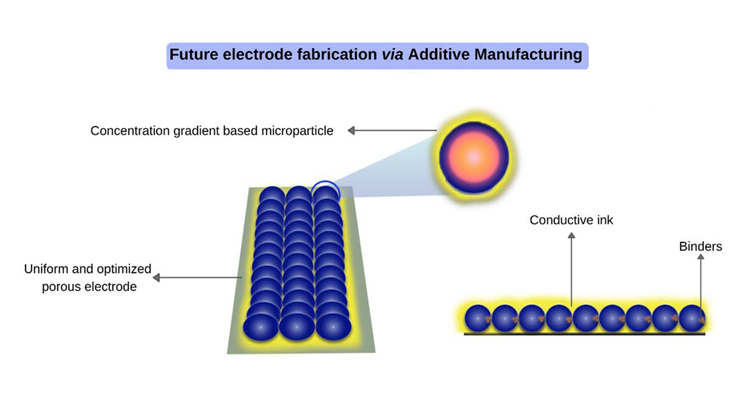 The advent of the industrial revolution increased the dependency of humans on fossil fuels which led to an increase in environmental degradation. While alternative energy sources such as wind, solar and hydro seem to be good options, their uncertainty in delivering the power made Dr Sujith Kalluri, Assistant Professor in the Electronics and Communication Engineering Department and his PhD scholar Chanakya Karra at SRM University-AP prefer batteries as a viable option. “Application-driven Industrial-scale Manufacturing of Li/Na-ion Battery Cathodes” is a paper published by Dr Sujith Kalluri and Mr Chanakya Karra in the Journal of The Electrochemical Society having an Impact Factor of 3.721 as part of their project to develop zero-emission energy methods.
The advent of the industrial revolution increased the dependency of humans on fossil fuels which led to an increase in environmental degradation. While alternative energy sources such as wind, solar and hydro seem to be good options, their uncertainty in delivering the power made Dr Sujith Kalluri, Assistant Professor in the Electronics and Communication Engineering Department and his PhD scholar Chanakya Karra at SRM University-AP prefer batteries as a viable option. “Application-driven Industrial-scale Manufacturing of Li/Na-ion Battery Cathodes” is a paper published by Dr Sujith Kalluri and Mr Chanakya Karra in the Journal of The Electrochemical Society having an Impact Factor of 3.721 as part of their project to develop zero-emission energy methods.Through this article as a platform, the authors focus on three aspects of energy storage devices that are essential while the world is catapulted to upgrade itself from fossil fuels to electric vehicles. From a battery level perspective, they have discussed the dependence of the battery industry on lithium-ion technology and its repercussions. As a solution, they suggest the distribution of the dependency on sodium-ion technology owing to its adaptability and wide availability. From the cathode level perspective, the paper suggests co-precipitation through the CSTR as a customized solution to address the setbacks in the synthesis process and additive manufacturing as a preferred solution to cater for the desired electrode design specifications that would comply with the needs of future generations and the industry. Till the battery energy storage system paves the way for Na to take over, we can reckon on SC-NCM cathode material to serve the needs.
Read the full paper here: https://iopscience.iop.org/article/10.1149/1945-7111/abfab6/pdf
More about the Battery research project of SRM University-AP:https://srmap.edu.in/seas/electronics-and-communication-engineering/research-areas/battery-research/
Continue reading →
- Biochar for environmental sustainability in the energy-water-agroecosystem nexus. July 5, 2021
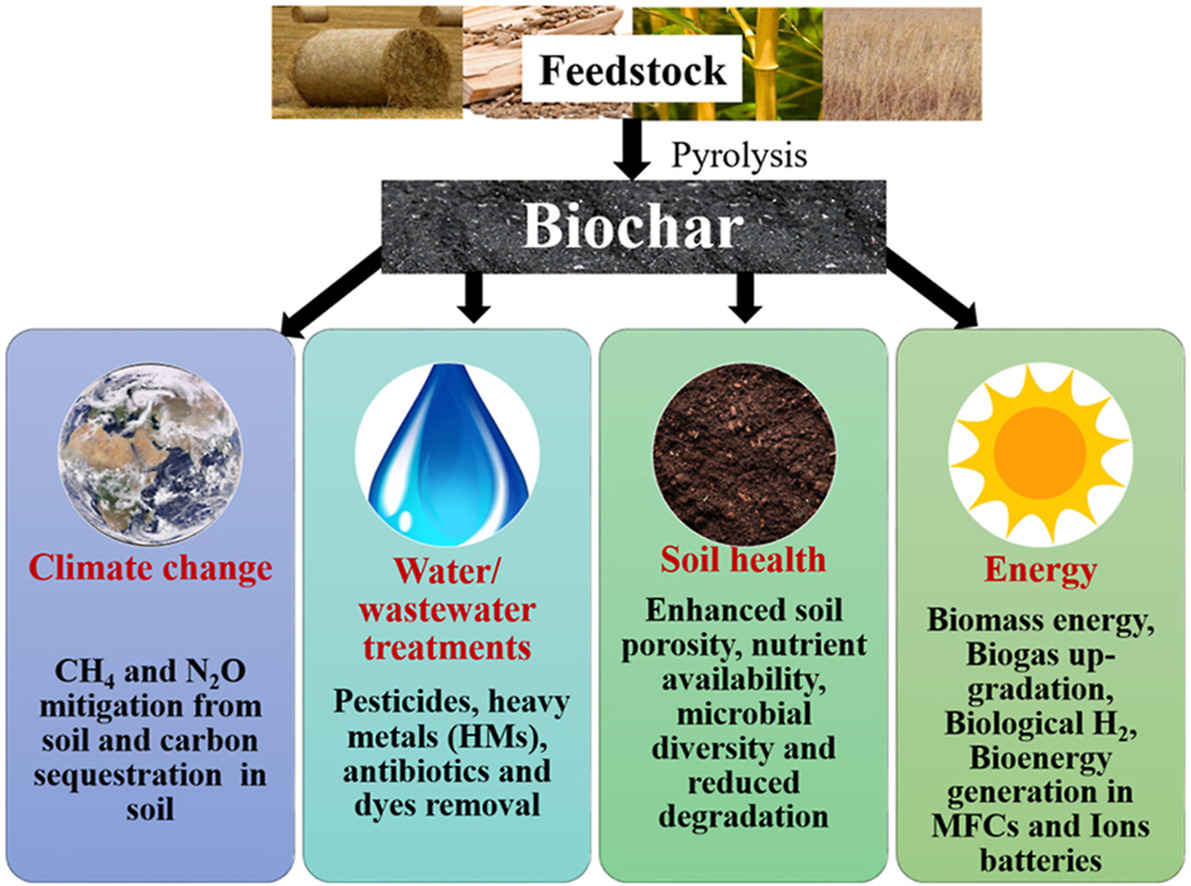 Biochar has an enormous potential in addressing global issues and can act as a catalyst in achieving sustainable development goals (SDGs). Dr Lakhveer Singh, Assistant professor in the Department of Environmental Science, SRM University-AP has co-authored and published a paper on the title “Biochar for environmental sustainability in the energy-water-agroecosystem nexus” in the research journal “Renewable and Sustainable Energy Reviews” with an Impact factor of 14.98.
Biochar has an enormous potential in addressing global issues and can act as a catalyst in achieving sustainable development goals (SDGs). Dr Lakhveer Singh, Assistant professor in the Department of Environmental Science, SRM University-AP has co-authored and published a paper on the title “Biochar for environmental sustainability in the energy-water-agroecosystem nexus” in the research journal “Renewable and Sustainable Energy Reviews” with an Impact factor of 14.98.Global warming, management of soil health, remediation of contaminated wastewater, and sustainable alternate source of energy are the major challenges of the 21st century. Biochar produced from waste biomass (crop residues, algal biomass, municipal waste, etc.) has dual advantages of waste management along with its application in different sectors. Biochar addition to soil improves soil health, porosity and aeration which mitigates greenhouse gas emission from soil.
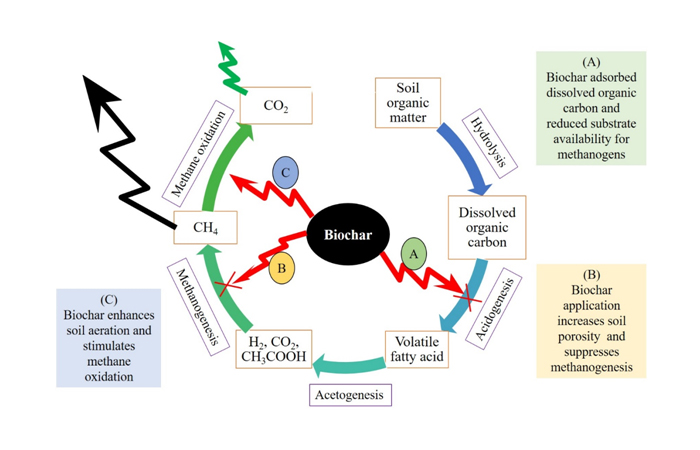 In this manuscript, Dr Lakhveer Singh discusses the potential of biochar for bioenergy production (biogas and biological hydrogen production), greenhouse gases mitigation, carbon sequestration in soils, and wastewater remediation are discussed in detail along with the challenges and future prospects of biochar. This work has been executed in collaborations with the National Institute of Hydrology, Jal Vigyan Bhawan, Roorkee; J.C. Bose University of Science and Technology; YMCA, Faridabad; and IIT Delhi.
In this manuscript, Dr Lakhveer Singh discusses the potential of biochar for bioenergy production (biogas and biological hydrogen production), greenhouse gases mitigation, carbon sequestration in soils, and wastewater remediation are discussed in detail along with the challenges and future prospects of biochar. This work has been executed in collaborations with the National Institute of Hydrology, Jal Vigyan Bhawan, Roorkee; J.C. Bose University of Science and Technology; YMCA, Faridabad; and IIT Delhi.Dr Singh is an Editorial Board member of the Journal of Biomass Conversion and Biorefinery – Springer (I.F. 2.60) and a Guest Editor for Bioresource Technology Reports- Elsevier.
Read the full paper here: https://www.sciencedirect.com/science/article/abs/pii/S136403212100664X
Continue reading → - End of Second Wave of COVID – 19 in 8 States of India June 28, 2021
A research study to predict the waning of the second wave of COVID-19 in Uttar Pradesh, Delhi, Karnataka, Maharashtra, Andhra Pradesh, Tamil Nadu, Kerala & West Bengal
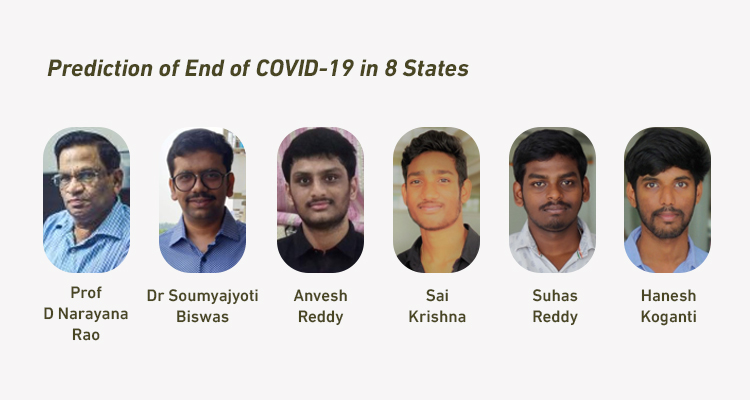
In the current pandemic situation, a pertinent question is the estimate of time by which the second wave of COVID – 19 spread could be contained and normalcy would return. In this context, Prof. D. Narayana Rao, Pro-Vice-Chancellor, SRM University – AP initiated the study to predict the End-Time of COVID – 19 in the states of Uttar Pradesh, Delhi, Karnataka, Maharashtra, Andhra Pradesh, Tamil Nadu, Kerala & West Bengal. Dr. Soumyajyoti Biswas of SRM University – AP along with 4 B.Tech Students: Mr. Anvesh Reddy, Mr. Hanesh Koganti, Mr. Sai Krishna, and Mr. Suhas Reddy have carried out an interesting study to predict the end time of the second wave of COVID – 19 spread in these states. Study employed Susceptible – Infected – Recovered (SIR) Model making use of the information on the COVID – 19 affected people and the number of recovered people, the data which the state governments make them available. SRM Team made use of these data employed SIR Model and applied the methods of Machine Learning. The End -Times of the spread of COVID-19 for different states are given in the following table:States Uttar Pradesh Delhi Karnataka Maharashtra Andhra Pradesh Tamil Nadu Kerala West Bengal End-time May 27 May 28 July 1 July 13 July 16 July 26 August 12 September 2 Errors -2 days, + 3 days -2 days, + 2 days – 6 days, + 5 days -7 days, + 7 days -16 days, + 28 days -17 days, + 33 days -14 days, + 14 days -30 days, + 30 days End-Time is defined as the date on which the number of COVID affected cases get reduced to 5% of the peak number of cases occurred in the particular state.
The model is also validated with the actuals occurred in the States of Delhi and Uttar Pradesh.
Uttar Pradesh: Peak of 37,944 was n 24th April 2021 and 5% of the peak number is 1897 and is predicted to occur on 27th May with an error of -2 days to +3 days
Actuals: 27th May: 3179, 28th May: 2276, 29th May: 2014, 30th May: 1864Delhi: Peak of 28,935 was on 20th April 2021 and 5% of the peak number is 1490 and is predicted to occur on 28th May with an error of – 2 days to + 2 days
Actuals:26th May: 1491, 27th May : 1072, 28th May : 1141The validation mentioned of the end-times of the second wave of COVID-19 spread increases our confidence level to the predictions made for other states also.
It can be noticed that in the States of West Bengal, Kerala, Tamil Nadu, and Andhra Pradesh, the second wave of COVID-19 continues to spread for longer periods and errors are large compared to the other states of Uttar Pradesh, Delhi, Karnataka, and Maharashtra. Perhaps, these factors could be attributed to the large gatherings that have occurred in the 4 states on several occasions.
Prof Narayana Rao said that these predictions mentioned above could help in estimating the impact on medium and small business sectors. In the education sector, it could help in planning the academic sessions, examinations, etc. It could also help to plan necessary medical infrastructure for healthcare in different states.
The details of the study can be found in [2105.13288] Machine learning predictions of COVID-19 second wave end-times in Indian states (arxiv.org)
Continue reading → - No.1 Business School in Germany admits Aaditya Jain from CSE June 25, 2021
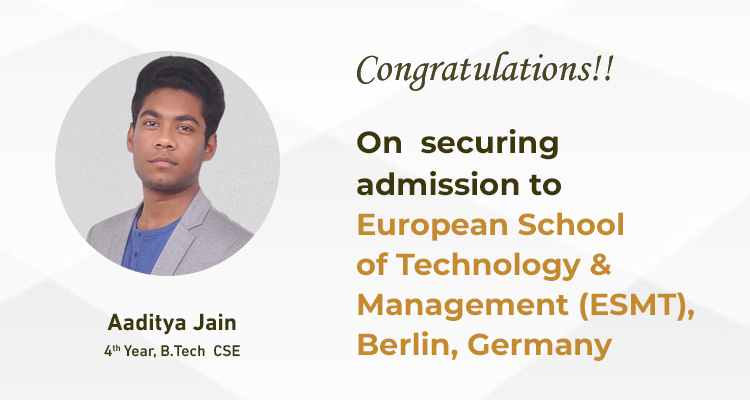 Here’s an exclusive interview with Aaditya Jain, a Computer Science Engineering graduate from SRM University-AP who has secured admission in ESMT Berlin, Germany.
Here’s an exclusive interview with Aaditya Jain, a Computer Science Engineering graduate from SRM University-AP who has secured admission in ESMT Berlin, Germany.Q. Hi Aaditya, please tell us about yourself.
I am Aaditya Jain, a Computer Science Engineering graduate of Batch 2021 at SRM University-AP. I have always been fascinated by Business and Management and the impact that technology can bring about in transforming them. I have led AIESEC in Amaravati for 2 years and have done various internships in the field of Business & Management.Q. Can you tell us your motivation behind applying to ESMT?
ESMT is a triple-accredited Business School, No.1 in Germany and No. 8 in Europe and No. 26 in the world (for its programme) according to ‘The Economist’, ‘Bloomberg Business’ and ‘Financial Times’- major ranking firms for the Business Schools. ESMT Berlin – European School of Management and Technology GmbH is located at the heart of Berlin, Germany. It is a business school founded by 25 multinational corporations including BCG, McKinsey, BMW, Allianz and others. I also applied to NOVA business school in Portugal, UCD Smurfit in Ireland and a few others.Q. Can you talk about the course that you have enrolled in?
I would be pursuing a Master’s in Management (MBA) specialising in Global & Digital Strategy at ESMT Berlin, Germany. This is a 2-year programme with integrated Internships and Social Impact Projects launching my career into the field of Management Consulting/Marketing.Q. Are you offered any scholarships there?
Yes, I am offered ‘Outstanding Student Leader’ scholarship of Euro 5500 by ESMT.Q. How was your preparation for these university applications?
I always knew that I wanted a career in Management and Business. Right from my freshman year, I worked towards it. I started and led AIESEC in Amaravati (something highly valued by Business Schools), and I also did internships in the field of Marketing & Strategy. I made sure I get a pro-bono internship experience abroad and for that, I did an internship in Greece, Athens. I wrote my GMAT and at the same time, focused on my Essays. I think it’s all about being honest and genuine with yourself and others that count in the end.Q. Can you elaborate on the support you received from SRM University-AP?
My university has immensely helped me in terms of both professional growth and financial assistance. I am grateful to SRM University-AP for providing me with sponsorship to attend my Master’s in these times of Covid-19 when everything is very uncertain. I am really thankful to Dr Srabani Basu who has helped me all throughout the 4 years of my journey at SRM AP. She mentored me, taught me business communication and interview skills, helped me develop my lateral thinking.Q. What are your dreams about the future?
Continue reading →
I want to work around the world, experience new cultures and be a pioneer in Digital and Strategic Transformation making sure the sustainable development of organisations. I also want to make sure that I impactfully and positively represent SRM University-AP wherever I go. - Foreign national students get placed in top-level companies June 24, 2021
SRM University-AP has established several milestones in research and academic achievements since its inception. 100% of graduating students from the Maiden Batch are successfully placed in top-level firms through the campus placement drive. Two international students, Raja Swarnakar and Ramesh Kumar Yadav are placed at “Quick ride”, the widely used carpooling and taxi pooling app in India. Ramesh joined as a Business Development Manager, and Raja is hired as an engineer immediately after completing their internship at Quickride, securing a salary of ₹5 LPA.
The multidisciplinary, research-oriented university provides students with transformational learning experiences. The Department of Corporate Relations and Career Services (CR & CS) is committed to delivering the greatest training and placement opportunities possible. Additionally, the training and placement cell conducts regular series of rigorous training sessions designed to hone the technical and soft skills of students. Numerous mock interviews were conducted to aid participants in increasing their confidence and aptitude skills. Experienced faculty members with global exposure support students to gain knowledge about the latest trends in the industry.
SRM University-AP goes an extra mile for its students by arranging workshops with industry professionals on how to tackle campus placement interviews and make appealing impressions on recruiters from their desired companies. The success stories of these students, in securing attractive careers with top-tier enterprises, speak volumes about the training they receive here.
Continue reading → - First private university to achieve twin foreign placement in maiden batch June 24, 2021
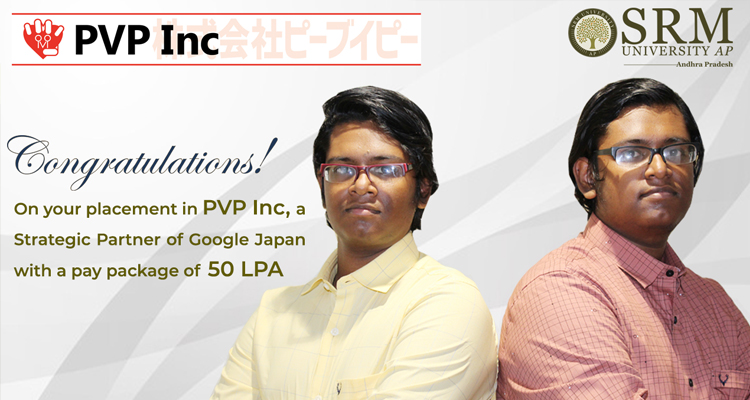 The prodigious twins of SRM University-AP proved their mettle again, cracking job offers with the highest salary of the season. Rajarshi and Saptarshi Mazumder from the Department of Computer Science and Engineering have been offered the positions of Technical Engineers-IT at PVP Inc Japan, a strategic partner of Google, Japan, with a pay package of 50 LPA. SRM University-AP becomes the first private university in India to achieve twin foreign placement in the maiden batch
The prodigious twins of SRM University-AP proved their mettle again, cracking job offers with the highest salary of the season. Rajarshi and Saptarshi Mazumder from the Department of Computer Science and Engineering have been offered the positions of Technical Engineers-IT at PVP Inc Japan, a strategic partner of Google, Japan, with a pay package of 50 LPA. SRM University-AP becomes the first private university in India to achieve twin foreign placement in the maiden batchComing from a small town in West Bengal, the twins joined SRM University-AP with dreams in their eyes. They struggled with their schooling due to the transferable nature of their father’s job, but it also prepared them with the mindset to overcome any obstacle that comes in their way to excellence. Rajarshi and Saptarshi found their educational abode in SRM University-AP, where their dreams and ideas were encouraged and nurtured.
“Every moment at SRM-AP was so defining. Academics and research, 24×7 student-run Next Tech Lab, Semester Abroad and Entrepreneurship at UC Berkeley, USA and winning Hackathon in Bay area competing with MIT, Stanford and Carnegie Mellon gave us the wide exposure of the real world, which would not have been possible without the continuous support of our faculty and university management. Now, it is time that we start our life in Japan, and we are very much looking forward to the new chapter,” said Rajarshi.
SRM University-AP is proud of its first graduating batch with a 100% Placement record, with most students getting multiple offers from reputed companies. 71% of students got Marquee, Super Dream, and Dream offers of ₹20+, ₹ 10+ and ₹ 5+ lakhs, respectively; and 600+ companies visited the university for recruitment. Top recruiters include Amazon, PayPal, Barclay, American Express, Bank America, Walmart, AB InBev, TCS, Cognizant, Infosys, L&T, AIS, JSW and Adani. The students of the Department of Computer Science and Engineering have bagged an attractive average salary of 8 LPA.
“SRM University-AP is founded with the vision to offer quality engineers, entrepreneurs and professionals to the country. In the Maiden Placement Drive itself, our graduates have shown predominance making the university a favourable destination for top industrial recruiters,” said Prof V S Rao, Vice-Chancellor, SRM University-AP.
Prof Ragunathan, Associate Dean in the School of Engineering and Sciences and Head of the Department of Computer Science and Engineering shared that our university has acquired the brand name as a prominent tech hub to the recruiters searching for the choicest engineers. “We are certain that in the coming years, the number of recruiters visiting will further increase, creating a record in the country”, he added.
Mr Vivekanandan, Assistant Director, Corporate Relations and Career Services, said that the department always looks for the best opportunities for the students. The aptitude of CSE students manifested in their internships, projects, curricular and extra-curricular endeavours naturally drew the attention of best recruiters to SRM University-AP.
Continue reading → - Mechanical Engineering graduate admitted into Northeastern University, Boston June 23, 2021
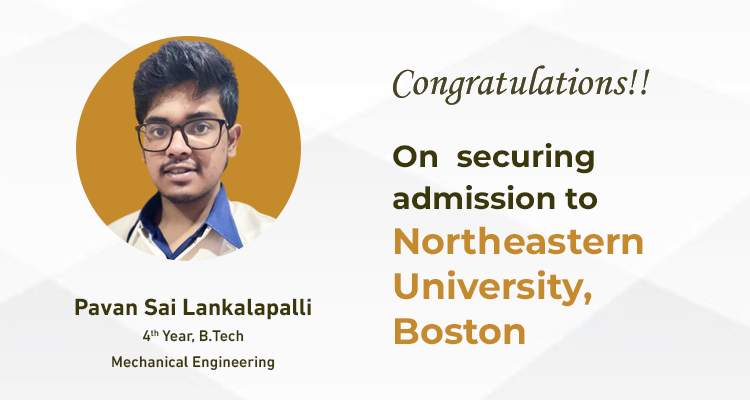 Lankalapalli Pavan Sai from the undergraduate department of Mechanical Engineering at SRM University-AP, Andhra Pradesh, has secured an astounding admission to Northeastern University (NEU), Boston for his higher education. The Master’s in Engineering Management programme that he has enrolled in meets F-1 international student status requirements and is purely designed for the Core background (i.e. Mechanical, Electrical, and Civil Engineering) students. Pavan Sai had also qualified to work with the global L&T Technology Services company through the campus placement at SRM University-AP.
Lankalapalli Pavan Sai from the undergraduate department of Mechanical Engineering at SRM University-AP, Andhra Pradesh, has secured an astounding admission to Northeastern University (NEU), Boston for his higher education. The Master’s in Engineering Management programme that he has enrolled in meets F-1 international student status requirements and is purely designed for the Core background (i.e. Mechanical, Electrical, and Civil Engineering) students. Pavan Sai had also qualified to work with the global L&T Technology Services company through the campus placement at SRM University-AP.According to Pavan Sai, NEU lies in the heart of Boston city which is one of the major hubs for startups and the University is known for its CO-OP program that gives hands-on experience in theoretical, quantitative, and analytical skills and tools. His decision to study abroad happened rather late though he qualified IELTS on time and has been preparing for GRE.
When he applied to NEU just two days before the deadline, the faculty and staff at SRM University-AP extended their full assistance to go by the application. “I cannot forget the assiduous support and mentorship of my Professors Dr Satya Pramod Jammy and Dr Venkata Nori from the Department of Mechanical Engineering”, says Pavan Sai. “I also want to thank SRM University-AP for helping me and providing me with opportunities”, he adds.
Continue reading → - Distribution of essential food commodities among the underprivileged June 23, 2021
Continue reading → A food distribution drive among the villagers was held on Sunday June 06, 2021, at SRM University-AP, Andhra Pradesh. The distribution of goods was carried out with the support of SRM Trust. Prof V S Rao, University Vice-Chancellor, and Dr B Sivakumar, Deputy Dean-Academic Affairs handed over several commodities like rice, condiments, sugar, and wheat flour to the people in need. In his remarks on the occasion, Vice-Chancellor Prof VS Rao stated that the programme was established with the good intention of assisting the underprivileged during the trying times of Corona. We will continue to carry out similar community service programmes in future. Later, the beneficiaries thanked SRM University President Dr P Satyanarayanan, Vice-chancellor V S Rao and Puthaiya Thalaimurai CEO Venkatagiri. The event was attended by University Campus Life Maintenence Director Venkatachalam S, Maintenance Manager Maria Leon, and Manager Chandra Prabhu.
A food distribution drive among the villagers was held on Sunday June 06, 2021, at SRM University-AP, Andhra Pradesh. The distribution of goods was carried out with the support of SRM Trust. Prof V S Rao, University Vice-Chancellor, and Dr B Sivakumar, Deputy Dean-Academic Affairs handed over several commodities like rice, condiments, sugar, and wheat flour to the people in need. In his remarks on the occasion, Vice-Chancellor Prof VS Rao stated that the programme was established with the good intention of assisting the underprivileged during the trying times of Corona. We will continue to carry out similar community service programmes in future. Later, the beneficiaries thanked SRM University President Dr P Satyanarayanan, Vice-chancellor V S Rao and Puthaiya Thalaimurai CEO Venkatagiri. The event was attended by University Campus Life Maintenence Director Venkatachalam S, Maintenance Manager Maria Leon, and Manager Chandra Prabhu.




